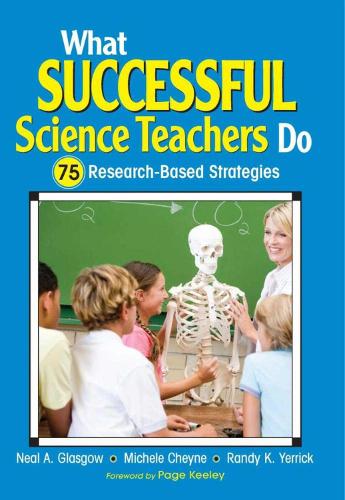
What Successful Science Teachers Do: 75 Research-Based Strategies
(Paperback)
Publishing Details
What Successful Science Teachers Do: 75 Research-Based Strategies
By (Author) Neal A. Glasgow
By (author) Michele C. Cheyne
Skyhorse Publishing
Skyhorse Publishing
10th October 2017
United States
Classifications
Professional and Scholarly
Non Fiction
Teacher training
Teaching of a specific subject
Educational: Sciences, general science
Science: general issues
507.1
Physical Properties
Paperback
272
Width 152mm, Height 229mm, Spine 23mm
379g
Description
The experience and science expertise of these award-winning authors makes this easy-to-use guide a teachers treasure trove. Included are seventy-five research-based strategies, each with a concise description of the supporting research, classroom applications, pitfalls to avoid, and references for additional learning. Teachers of students in grades K12 will find novel ways to engage childrens natural curiosity, concern, and creativity. Highlights include how to promote collaborative learning, differentiate instruction with culturally responsive practices, build students scientific literacy and reasoning skills, and involve parents in their childrens science learning.Highlights include how to:
Promote collaborative learning
Use formative assessment to engage students in content and instruction
Develop culturally responsive practices that invite contributions from diverse students
Build students' scientific literacy and reasoning skills
Incorporate students' Internet skills into their studies
When it comes to teaching science, you don't need to reinvent the wheel. Learn from the experts today and jump-start your science curriculum tomorrow!
Author Bio
Neal A. Glasgows experience includes serving as a secondary school science and art teacher in both California and New York, as a university biotechnology teaching laboratory director and laboratory technician, and as an educational consultant and frequent speaker on many educational topics. He is the author or coauthor of ten books on educational topics, including What Successful Schools Do to Involve Families and What Successful Literacy Teachers Do.
Michele C. Cheyne is a clinical faculty member in science education at the University of Pittsburgh where she teaches a variety of courses in the secondary science teacher preparation program. Cheyne has also worked with the Interstate New Teachers Assessment and Support Consortium in Washington, DC, as a member of the committee that wrote Model Standards for Licensing General and Special Education Teachers of Students with Disabilities. A former high school biology and chemistry teacher in Milwaukee Public Schools, she also served as a department chair and taught science methods courses at the University of Wisconsin-Milwaukee.
Randy K. Yerrick is a professor of science education and associate dean of educational technology at the State University of New York at Buffalo. Yerricks research focuses on implementing contemporary visions of science inquiry in lower track classrooms where students share a strong history of failure and antisocial school behaviors.
